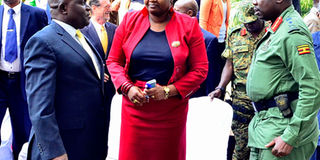Kiyonga tells Somalia to build own army

Dr Crispus Kiyong chats with Ms Lydia Wanyoto, the representative of the chairperson of Amisom at the launch of the conference in Kampala yesterday PHOTO BY DOMINIC BUKENYA.
What you need to know:
Take charge. Dr Kiyonga feels that Amisom should not be looked at as an occupying force since Somalia now has the capacity to take care of its political, social and economic affairs
KAMPALA. Somalia must build its own national army if the war ravaged country is to have meaningful stability, Uganda’s Defence minister Crispus Kiyonga has said.
“The Somali army must be built by yesterday. We offered to put special forces in Mogadishu to train the army but our partners said they were not ready. There is one group of the army supported by one donor and the other supported by another. The army cannot be built like that, at least not in Africa,” Dr Kiyonga said yesterday.
He was speaking at the official opening of a two-day retreat for the leadership of the African Union Mission in Somalia (Amisom) and key players at Sheraton Kampala Hotel.
He said he was aware that Somalia needs police, prisons and intelligence officers but the situation in Mogadishu requires an army. He said the Somali army can be built either by Somalis taking the mantle or waiting for external help. He called upon the African Union (AU) to improve their efficiency in Somalia.
“AU must get stronger in leading us in this mission. In my view there are things they should be doing which they are not,” said Dr Kiyonga.
He scoffed at the slow and disjointed handling of the Somalia situation by the international community.
“I have never understood the relevance of the International Contact Group (ICG) meetings which are held with some people excluded. My view is we should better the international community approach,” he said.
The ICG is an informal group of mainly Western UN ambassadors that was established at the United Nations headquarters in New York in June 2006 to support the process of peace and reconciliation in Somalia.
No compensation
Dr Kiyonga first paid tribute to Amisom soldiers and staff killed in an Al-Shabaab attack on December 25 in Mogadishu. He said despite an agreement between the peace contingents in Somalia that families of fallen soldiers should be compensated, many have not been paid.
“As of now we have families of 94 soldiers which have not been compensated two to three years down the road,” Kiyonga said. Families of dead soldiers are each entitled to $50,000 (approximately Shs 125m) in compensation.
He also said Uganda still awaits compensation for three MI-24 military choppers which crashed in Mount Kenya ranges in August 2012 en-route to Somalia for Amisom operations against the terrorist Al Shabaab insurgents. Seven UPDF soldiers were killed and 24 others wounded in the crash.
Political unity
Somali political class, according to Dr Kiyonga, must have cohesion if pacification of the country is to be achieved.
However, Ms Lydia Wanyoto, the deputy special representative of the chairperson of the African Union Commission in Somalia, says Amisom’s next challenge is to address the structural challenges in the liberated territories.
She says things such as providing support to the Somali government in national dialogue and local reconciliation must be considered in order not to turn the populations against the government.
She says the liberation may become an occupation force if the people cannot benefit from tangible peace dividends.
The two-day retreat in Kampala seeks to formulate practicable measures necessary for effective handling of the current realities in Somalia.




